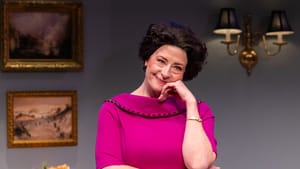Stay in the Loop
BSR publishes on a weekly schedule, with an email newsletter every Wednesday and Thursday morning. There’s no paywall, and subscribing is always free.
Inside the First Lady’s office
Act II Playhouse presents Eric H. Weinberger and Elaine Bromka’s Tea for Three: Lady Bird, Pat, and Betty

Tea for Three, a one-woman show written by Eric H. Weinberger and Emmy-winning actor Elaine Bromka (who often starred in the show herself), is designed for the kind of actor who can hold an audience in rapt attention for 90 minutes as she portrays three former First Ladies in three different monologues. At Ambler’s Act II Playhouse, Sabrina Profitt is just that kind of performer, electrifying the stage with her nuanced and complex portrayals of Lady Bird Johnson, Pat Nixon, and Betty Ford.
The play is set in the Office of the First Lady, impeccably designed by Meghan Jones, who adds subtle changes between each monologue by switching out and adding set pieces like flower arrangements, tea sets, a radio, and other details that capture both the personalities of each First Lady and the era during which she served.
Lady Bird, Pat, and Betty
We first meet Profitt in a brunette wig as a gracious, kind Lady Bird Johnson. Profitt perfectly sounds the part, capturing Johnson’s Southern drawl and inflections. Her performance here is very poignant, showing Johnson’s intelligence and resilience and all that she suffered in her treatment from LBJ, who did not hide his womanizing, criticized his wife’s choice of clothing, made disparaging remarks about her weight, and worse. Profitt takes us into Johnson’s vulnerability, evoking what it felt like to not only withstand that kind of abuse from her husband with no recourse but also to carry the fact that the public missed and mourned Jackie and JFK and the Camelot years, for which she and LBJ were no substitute.
As Pat Nixon, Profitt appears in a coiffed blond wig and conservative dress and gets even more dramatic material: this First Lady is emotionally controlled (she tells us that she is ashamed that she cried at her mother’s funeral) but also sharp, smart, tough, and funny. She comes to life when chatting casually with a Secret Service man on the rotary telephone—their rapport is warm and intimate, everything that is the opposite, we learn, of what she now experiences with her husband. The Watergate tapes have just been leaked; Nixon walks the perimeter of her office in circles, embodying her sense of being trapped in the cage of her marriage, her lack of choices, and the end of her dreams.
Betty Ford arrives as a breath of fresh air after Nixon’s emotional breakdown. She is bubbly, engaging, and ebullient: telling us about her love for her husband, her support for the Equal Rights Amendment, and going through a breast cancer diagnosis and mastectomy in a public way at a time when speaking of breast cancer was done in hushed tones. Betty is down-to-earth and relatable. But she is also pouring drink after drink as she engages us. We in the audience know what shadow is lurking beneath her carefree demeanor and what’s ahead for her.
Presidential politics for women today
But her part in this biographical play is a turning point: Ford is a woman aware that she can have a voice and a real partnership with her husband. The audience I joined for the show was largely made up of people who could remember the eras of these first ladies firsthand; they eagerly sang along to the great soundtrack of 1960s and 1970s music that accompanied each set change between the monologues. It would be fascinating to see how younger generations might respond to this work and whether the lives of these first ladies feel as historical as a play about Martha Washington or Dolly Madison or Eleanor Roosevelt might feel.
I would love to see this play in repertory with a new play that tackles the more challenging questions of what it means for women to run for president today; a play that explores the chauvinism Hillary Clinton faced, which now targets Nikki Haley. That is the story unfolding now, and while it might feel like a lot has changed since Lady Bird Johnson’s day, the legacy of sexism that still rages through our political life impacts our democracy in devastating ways.
What, When, Where
Tea for Three: Lady Bird, Pat, and Betty. By Eric H. Weinberger and Elaine Bromka, directed by Mary Martello. $37-$49. Through February 18, 2024, at Act II Playhouse, 56 E. Butler Ave, Ambler. (215) 654-0200 or act2.org.
Accessibility
Those in wheelchairs can enter Act II through a side exit door that leads to a ramped aisle in the theater; call the box office in advance to arrange. The venue has an indoor elevator that accesses the theater, upper lobby, and restrooms.
Sign up for our newsletter
All of the week's new articles, all in one place. Sign up for the free weekly BSR newsletters, and don't miss a conversation.

 Gabrielle Kaplan-Mayer
Gabrielle Kaplan-Mayer